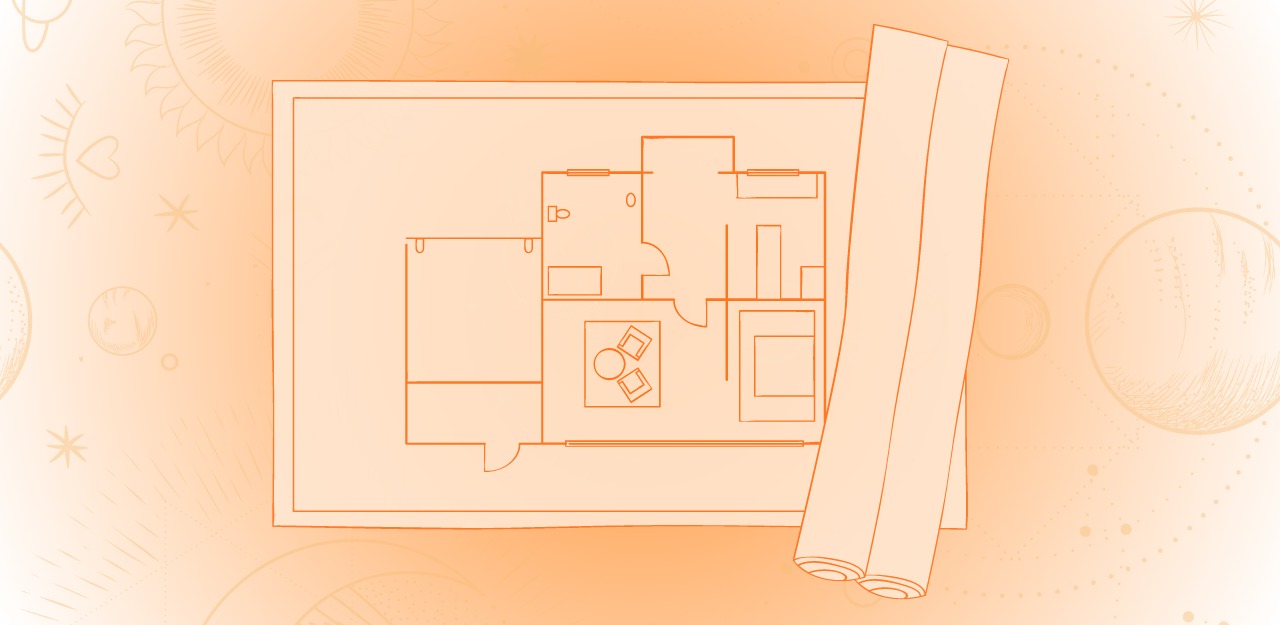What is Vastu Shastra
What is Vastu Shastra

Vastu, the ancient Indian science of architecture and construction, is the art of creating a home that harmonizes with nature. Vastu's primary goal is to harmonize humans with their surrounding environment—including nature and its elements—and at the core of all Vastu principles are five sacred elements (also known as Panchatattva or Panchabhuta), also known as direct exposure to nature.
Vastu aims to promote health and well-being. Its benefits include more positive energy flow, clarity in thinking and action, stability in family relations, greater happiness at work and play, and a more harmonious environment within the home or office. Vastu Shastra is said to be the science of directions that combines constructional practices, astrology, mythology, and other spiritual sciences.
How Can Vastu Affect Your Daily Life?
Vastu is the ancient Hindu science of architecture. Its principles are based on the idea that everything contains basic life energy or prana. Prana is the life force that flows through the body, giving it strength, balance, and health. If you find yourself in an environment that has negative prana, your body’s natural energy will be weakened and you will feel ill at ease.
Vastu is all about creating harmony between your home and yourself so that you can live in comfort and happiness. It takes into account all aspects of your life such as physical health, wealth, relationships with other people, personal growth, etc., and ensures that they are balanced by creating harmony within yourself as well as around you.
Vastu Shastra helps to align living spaces with a compass direction to achieve harmony between the five elements: ether (space), air, light, fire, and water. The goal is to improve health, wealth, and happiness among human beings living in these homes.
The five elements—earth, fire, water, air, and space—are interconnected and affect each other. They are also connected to the directions of the compass. For example: if your home faces south then it's considered auspicious for prosperity; if it faces north then it's not so good for health or wealth; if your home is on top of mountains then you may have trouble keeping out thieves but at least you'll be healthier than those who live in lower valleys where there's more moisture!
There is a lot of talk in the media about how Vastu can affect your luck and fortune, but it’s not just about good luck or fortune. It’s more about aligning yourself with the universe so you can live within its environment.
The concept of Vastu is based on living in harmony with nature, and this includes both man-made objects like buildings and furniture as well as natural elements such as wind and water. This allows us to channel our energy into positive things instead of being distracted by negative feelings that come from being out of balance (or out of sync).
Importance of Vastu
Vastu Shastra is an ancient science that helps in getting positivity, peace & prosperity by dwelling in structures designed as per this science. Vastu Shastra has its roots in the Vedas and Upanishads. It means the science of architecture, which deals with designing a building or anything else according to the laws of nature so that it becomes beneficial for living beings. In simple terms, it is called “Architectural Science” or “Vastu Vidya” written by Sage Viswamitra (the first architect), who was also one among seven great sages along with Lord Rama and Maharishi Yagyavalkya, etc., who wrote down various existing scriptures like Vedas, Puranas, etc., during Tretayuga (Third Age).
Vastu is more than just a superstition or religious belief system. The practice of Vastu Shastra can be traced back to Vedic times (1500 BCE–500 BCE). It was first documented by Rishi Bhardwaj around 700 BC when he wrote Brihat Samhita which deals with architecture, architecture tools & measures for buildings, etc.
Vastu Shastra is an ancient Indian architecture that advocates for designing houses, buildings, and other structures in accordance with the natural energy flow around them so as to harness its positive energy while minimizing its negative effects. It also suggests ways of keeping good health by creating favorable conditions in your home or workplace through simple changes like painting walls or making minor adjustments in furniture placement which will help bring harmony between people living/working together.
What Do Different Directions Mean in Vastu?
Vastu is a science of architecture, which is based on eight directions. All the directions are separated by three faces, each face contains 45 degrees. Vastu is also part of astrology. Each direction has its own characteristics and affects the human mind in different ways.
East
The east is the direction of the rising sun, and this makes it a very auspicious place in Vastu. It is the direction of good luck, wealth, and knowledge.
South-East
South-East is the direction of Lord Brahma, the God of knowledge and wisdom. The southeast direction is considered auspicious for study tables or any other work related to education. The southeast is beneficial for financial growth because it brings wealth to your home.
West
The west direction is the direction of death and wealth. West is also where you should put books since knowledge comes from this direction.
North-West
North-West is the direction of the planet Mars. The North-West is a direction of power, energy, and courage. It can also be considered as a negative direction where there will be anger and rage. If you have anything to do with this side, you need to control your temper well because it may cause you harm if not controlled properly.
If you want to grow in life then this is one place where you should place your money plant or other plants that represent fruitful growth in life.
South-West
- South-West is the direction of the stomach and liver.
- South-West is the direction of your body's digestion.
- South-West is the direction of your body's excretory system (your kidney and bladder).
- South-West is also associated with your reproductive system.
North
North is the direction of fire. The north and the fire are synonymous in Hindu culture, as the god Agni (fire) resides in this direction. In ancient times, a common practice was to worship the sun by facing north during sunrise or sunset. The element of fire is associated with energy and action—it's hot, it burns brightly and quickly, and it can be destructive if not properly contained.
North-East
The North-East direction is the most auspicious direction in Vastu. It is also known as Kuber’s direction and said to be ruled by Brahma, Kuber, and Lord Shiva. All four Vedas start from this direction and hence it has an excellent influence on your life.
If you want to bring harmony into your life, keep a crystal ball or a plant pot in this corner of the room. This area should always have natural light flowing through windows or open doors as well as proper ventilation for good air circulation inside your home!
South
The south is the direction of the sun, and it represents life, energy, and activity. It's also associated with fire, growth, and the heart. In this direction, you'll find your self-expression and your motivations for living. The south is where your mind lives; it's where you think about your future plans for success in life.
So if you're having trouble thinking about how to make your new dream home a reality—or if you're struggling with any other aspect of life—the south may be a good place to look for answers!
What Should We Place and Avoid Placing in These Directions?
The direction of your home is very important because it influences the energy around your house. Many directional guidelines are there in accordance with the Vastu Shastra.
Main door - South and East direction
- The main door of your house should be in the south or east direction.
- In case you have no option but to keep your main door in the north direction, then it should be open towards the south direction. If you are going to place a window on the northern wall, then make sure that it looks towards the east or west side only, not north and not south-west corner respectively.
- Do not keep your main door on the west side at all costs! This means that if there is no other way out of your house except through this door, then make sure that the doorway faces east or south only, not west or north-west corners respectively.
Pooja room should be in the North-East or at the Center of the home (Poorna)
The Pooja room should be in the northeast or at the center of the home (Poorna). It is a prayer room and should not be used for other purposes.
A Pooja room can be set up in any direction, but if it has to face directly east or west, then it will have to be built with windows on both sides (to allow light from either side) and this may not always fit with your architecture style or design.
Staircase should not be in the South-West direction
- Avoid placing heavy items in the South-West direction.
- Avoid placing heavy items on South-West floor levels.
- Avoid building a staircase in the South-West direction.
Bathroom or water tank should not be in the Centre of the home, East or North-East direction
The bathroom or water tank should not be in the centre of your home. If you have one, it should be located in a South-East or North-West corner. Bathrooms are considered to be very important places in any home as they are used for cleaning and bathing purposes. Hence, they should not be placed near any other bad directions such as North-East or East because these directions have negative energy that can affect your health.
The bathroom also needs to be kept away from bedrooms and kitchens. The best way to create this space is by placing a wall between these rooms so that there is no direct access from one room to another (or if this cannot be done, then windows should also be put up).
Kitchen should be in North-West or South-East direction
- Your kitchen should be in North-West or South-East direction.
- You can also place the kitchen in the South-East corner of the house, but make sure that you avoid placing it in the other four corners.
- Avoid placing a kitchen nearby bedrooms as it will cause health problems for you and your family members.
Bedrooms should be in the South-West direction
When you are making plans for a bedroom, you should keep in mind that the South-West direction is the most auspicious for bedrooms. The southwest direction is considered very auspicious for bedrooms because it ensures that your health and well-being are taken care of by the god and goddess, who reside in this direction.
The southwest corner of your house is also considered to be very beneficial for the relationship between husband and wife as there is an abundance of positive energy present in this area.
Master bedroom can be in West direction
The master bedroom can be in West direction.
- The west direction is good for health, peace of mind and much more. This is because the Sun sets in this direction and it has a positive impact on human beings.
- It gives energy to people who spend most of their time in this room or at least stay overnight as they sleep here.
- A person staying there will have an easy time falling asleep as this room will help them relax their body and mind which helps them go into a deep sleep quickly.
FAQs
Q1 What is the aim of Vastu design?
Ans The aim of Vastu design is to promote health and well-being. Its benefits include more positive energy flow, clarity in thinking and action, stability in family relations, greater happiness at work and play, a more harmonious environment within the home or office
Q2 What is the meaning of the term ‘Vastu Shastra’?
Ans Vastu means “space that creates” and Shastra means “formula” or “study of something” in the Sanskrit language.
Q3 Is Vastu similar to Feng Shui?
Ans It’s similar to Feng Shui, but has a unique set of principles.
















